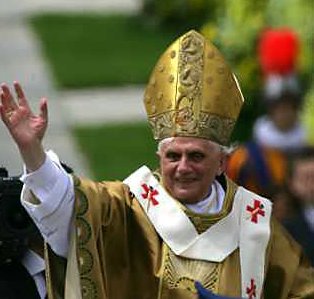On the Fourteenth Sunday Per Annum
Zechariah 9:9-10Rejoice greatly, O daughter Zion!
Shout aloud, O daughter Jerusalem!
Lo, your king comes to you;
triumphant and victorious is he,
humble and riding on a donkey,
on a colt, the foal of a donkey.
He will cut off the chariot from Ephraim
and the warhorse from Jerusalem;
and the battle-bow shall be cut off,
and he shall command peace to the nations;
his dominion shall be from sea to sea,
and from the River to the ends of the earth.
Romans 8:9, 11-13But you are not in the flesh; you are in the Spirit, since the Spirit of God dwells in you. Anyone who does not have the Spirit of Christ does not belong to him. If the Spirit of him who raised Jesus from the dead dwells in you, he who raised Christ from the dead will give life to your mortal bodies also through his Spirit that dwells in you.
So then, brothers and sisters, we are debtors, not to the flesh, to live according to the flesh—for if you live according to the flesh, you will die; but if by the Spirit you put to death the deeds of the body, you will live.
Matthew:25-30At that time Jesus said,
‘I thank you, Father, Lord of heaven and earth, because you have hidden these things from the wise and the intelligent and have vealed them to infants; yes, Father, for such was your gracious will. All things have been handed over to me by my Father; and no one knows the Son except the Father, and no one knows the Father except the Son and anyone to whom the Son chooses to reveal him.
‘Come to me, all you that are weary and are carrying heavy burdens, and I will give you rest. Take my yoke upon you, and learn from me; for I am gentle and humble in heart, and you will find rest for your souls. For my yoke is easy, and my burden is light.’
If by the Spirit you put to death the deeds of the body, you will live.
So here lies the rub, and my on-going beef with St. Paul. What, exactly, does it mean to put to death the deeds of the body? Is this some veiled—or not so veiled—works righteousness? Or, does Paul suggest a radical trust in the Mercy of God? Are we to rely on our ability even commitment to change in this life, or do we trust that God accepts us as we find ourselves in Christ. Do we know ourselves so accepted, saved, by the very reality of our baptism, or must we rely on our new-found goodness as the effective sign of our membership in Christ?
So here lies the rub, and my on-going beef with St. Paul. What, exactly, does it mean to put to death the deeds of the body? Is this some veiled—or not so veiled—works righteousness? Or, does Paul suggest a radical trust in the Mercy of God? Are we to rely on our ability even commitment to change in this life, or do we trust that God accepts us as we find ourselves in Christ. Do we know ourselves so accepted, saved, by the very reality of our baptism, or must we rely on our new-found goodness as the effective sign of our membership in Christ?







